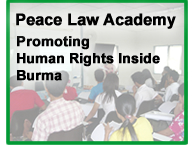Human Rights Now, a Tokyo based international human rights organization
constituted by lawyers, academic, activists and citizens calls for:
1. The immediate release of all lawyers arrested under preventative
detention measures, including, without limiting the generality of the foregoing,
Asma Jahangir, United Nations Special Rapporteur on freedom of religion or
belief; Aitzaz Ahsan, President of the Supreme Court Bar; over 50 members of
the Human Rights Commission of Pakistan (HRCP) including Executive Director I.A
Rehman, Secretary-General Iqbal Hiader (former attorney general of Pakistan)
and Jawed Iqbal Burqi; Muneer A Malik former president of the Supreme Court Bar
Association; Imran Qureshi, of the Women's Rights organization; Ali Ahmed
Kurd, former Vice Chair of the Pakistan Bar Council; Tariq Mahmood, Ali Ahmed
Kurd, Abrar Hassan, Ahsan Bhoon and others,
2. Strict adherence by the State and state officials to all Pakistan laws
and to applicable international standards governing the guarantees, safeguards,
rights and freedoms app! licable to the role of lawyer, including those
embodied in the UN Basic Principles on the Role of Lawyers
3. Strict adherence by the State and state officials to all Pakistan laws
and to applicable international standards governing the humane treatment of prisoners,
including the universal non-derogable prohibition against torture;
4. Appropriate civil and criminal remedies for violations of the
rights of those detained.
5. Dismissal of the warrant for the arrest of United Nations
Special Rapporteur in Human Rights Defenders, Hina Jilani.
6. The immediate re-instatement of and adherence to the
Constitution of the Republic of Pakistan and rescission of the Emergency
Declaration of November 3, 2007, the Provisional Constitutional Order No. 1 of
2007 and the Oath of Offices (Judges) Order, 2007
It is apparent that
the above named and numerous other Pakistan lawyers have been arrested and
detained solely to prevent them from carrying out their professional duty to
advocate vigorously against the arbitrary suspension of the rule of law and
violation of human rights by the Musharraf regime, and for the restoration of
law in Pakistan. Reports indicate that the lawyers arrested have been
subjected to a number of serious violations of their fundamental rights in
addition to arbitrary arrest and detention, including denial of due process,
denial of necessary medical attention, denial of access to legal
representatives and visitors and exposure to the possibility of torture and
other prohibited inhumane treatment. Recent (November 11, 2007) amendments were
made to the law to allow the trial of lawyers and other civilians by military
courts for a range of acts including making statements 'conducive to public
mischief'.
HRN states that
lawyers in Pakistan are duty bound to uphold the rule of law and to advocate
for justice and against repression.
To do so, they must be willing and free to stand between the state and the citizen
and to criticize and call into question the actions of the State when human
rights are threatened.
Norms of international law establish minimum standards protecting the advocacy
rights of lawyers and these standards have been adopted by Pakistan both as a
member of the United Nations and the Commonwealth Secretariat.
The UN Basic Principles on the Role of Lawyers,
at Articles 16 and 17, require Pakistan to ensure that lawyers are free to
"perform all of their professional functions without intimidation, hindrance,
harassment or improper interference..." and "where the security of
lawyers is threatened as a result of discharging their functions, they shall be
adequately safeguarded by the authorities." Furthermore, Article 23 of the
UN Basic Principles on the Role of Lawyers provides that "Lawyers like
other citizens are entitled to freedom of expression, belief, association and
assembly. In particular, they shall have the right to take part in public
discussion of matters concerning the law, the administration of justice and the
promotion and protection of human rights ."
Pakistan is also obligated to respect the prohibitions against torture, arbitrary
arrest and detention contained in, inter alia, the Universal Declaration of
Human Rights (UDHR). State practice and opinio juris have resulted in
these rights becoming part of customary international law.
Regardless of the current status of the Pakistani Constitution, the Islamic
Republic of Pakistan remains obligated to observe these basic tenants of
international law.
HRN condemns military president General Pervez Musharraf's repression of the
peaceful efforts of members of the Pakistani Bar to uphold the law and to
advocate for the rule of law, the independence of the Pakistan judiciary and
adherence by the Musharraf regime, to the Constitution of the Islamic Republic
of Pakistan.
HRN condemns the extra-legal measures being
used to punish the legitimate and lawful exercise of freedom of speech and
assembly by lawyers.
HRN view the Emergency Declaration and subsequent changes to Pakistan law as
being illegitimate, prohibited by both the Constitution of the Republic of
Pakistan and by international law, with a cloak of apparent legality.
Background
When military President Musharraf sacked the Chief Justice of the Pakistan Supreme
Court on March 9, 2007, hundreds of lawyers rallied and spoke publicly in
support of the Chief Justice and against proceedings brought against him by
Musharraf. Protests by lawyers, judges and others continued up to July
20, 2007 when the Supreme Court of Pakistan ordered Chaudhry reinstated as
Chief Justice and dismissed the proceedings against him as illegal.
The repression of lawyers by the Musharraf regime recommenced when a state of
emergency was declared and the Pakistan Constitution suspended on November 3,
2007. The suspension of the constitution resulted in the repeal of fundamental
human rights, including the right to life and liberty, freedoms of assembly,
association and speech, equality before and equal protection of the law.
Core legal rights related to arrest and detention are also repealed, including
the right to counsel. Since then, thousands of
lawyers and human rights activists have been arrested and detained.







